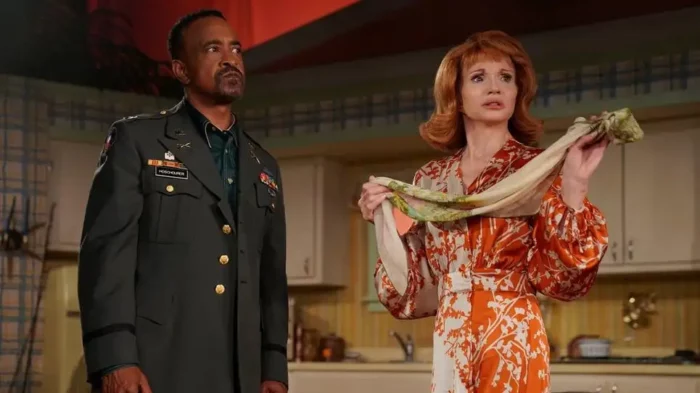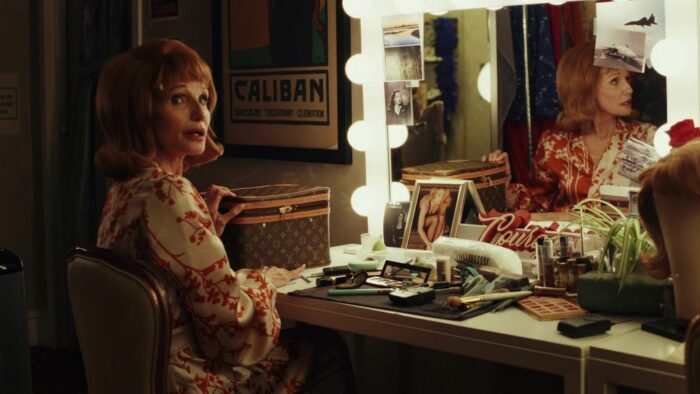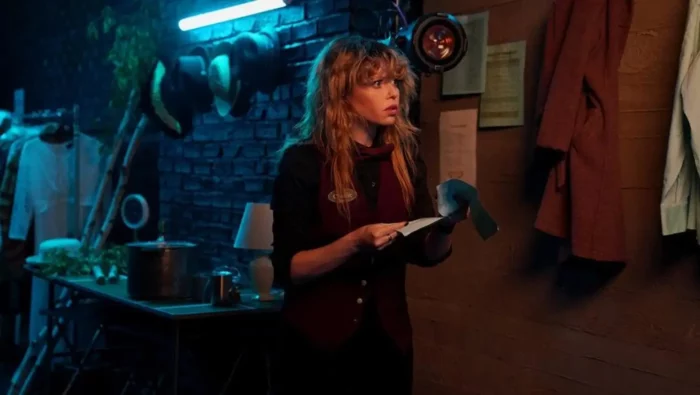The following recap contains spoilers for Poker Face S1E6, “Exit Stage Death” (written by Chris Downey and directed by Ben Sinclair)
Poker Face S1E6, “Exit Stage Death,” really makes me wonder how it is that the series works so well because sometimes, in episodes like this one, the elements feel like they should not fit together. The format—watching the murder happen first— means that the show’s biggest plus, Natasha Lyonne, is off-screen for the first 20 minutes nearly every week. Rian Johnson is the showrunner sure, but he isn’t directing every episode. The guest cast is impeccable, but they can only do so much with the characters they are given.
But, in “Exit Stage Death” Lyonne is off-screen for at least the first 30 minutes and then has very limited screen time even after that, Johnson isn’t directing, and the guest characters are unbearably awful, and yet somehow the show still has that amazing vibe that has made critics fall in love with it. The format of Poker Face is great, and that rehash of the familiar helps, but it can only go so far. It is definitely a testament to the creative team behind the show that they have been able to make this show work for each of the first six episodes.
As I noted last week, my plan with these recaps is to have them follow a formula and hope that the same alchemical magic that pervades the show also applies to them. Though, as I am neither Johnson nor Lyonne, the results may vary.
The Plot
“Exit Stage Death” centers around the stage, specifically the fictional Seneca Lake Dinner theater near Chicago, and makes tremendous use of the setting. Everything about the little dinner theatre feels right. From the once famous television stars coming back for one last bite of glory to the completely checked out crew and actively disinterested waitstaff—except for the obligatory super fan—the way Poker Face S1E6 utilized the trappings of life on the lower levels of theater stage was perfect.

The plot itself is ridiculous, and I have enjoyed this about a few of the Poker Face plotlines—they don’t all use Charlie’s (Natasha Lyonne) superpower of knowing about lies to solve the murder, because some people like Kathleen Townsend (Ellen Barkin) and Michael Graves (Tim Meadows) are so terrible at doing murder and covering their tracks that all it takes is someone mildly interested to look at what happened and the whole scheme falls apart like a pasteboard prop wall.
Michael and Katleen used to star together on Spooky and the Cop (between this show and Brazos over on Only Murders in the Building current shows are creating more ’80s detective shows that I would want to watch than there are real ones) but have fallen on hard times since the show ended. Michael has since married Ava (Jameela Jamil) who is extremely wealthy. Kathleen convinces Michael to do an old play, Ghosts of Pensacola, with her one more time, and from there Ava winds up dead.
It turns out that the two old partners are still lovers (they are named after Kathleen Turner and Michael Douglas after all) and they conspired to make it look like they were fighting and set up a bunch of death traps on stage that led, in a wild series of events, to Ava’s death. It is farce at the highest level, and once again, shouldn’t really work, but somehow all the elements come together exactly as they planned. Until Charlie gets involved.
The Guest Stars
Ellen Barkin and Tim Meadows are probably the most essential guest stars on the series yet, particularly Barkin. It is essential to dislike Kathleen, think that she is both interested in and capable of killing Michael, and believe that she is a good enough actress to have convinced everyone, including Ava, that she hates Michael. She also has to be believable as a second-rate actress who (as Charlie confirms) does not convey “truth” in her craft. Barkin, who is a tremendously talented and probably underrated actress, is able to pull it all off.
She is also able to pull off the multiple extended monologues from the in-show play they are performing, Ghosts of Pensacola. The play is basically a parody of a Tennessee Williams play, a sort of A Streetcar Named Desire without wit and nuance. But the most amazing thing about Kathleen—after the murder has been discovered—and Barkin’s performance is that when she is on, she can elevate any material, including this fun, but ridiculous, play.

The episode ends not with the cops arresting the murderers or Charlie heading on to the next gig, but with Kathleen onstage giving her big monologue from the play for the third and final time. Charlie watches from the bar, crying, and the crowd is riveted. Kathleen, and by extension Barkin, is finally telling the truth through her words. It is beautiful and sad, then she jumps through the trap door. The screen cuts to black.
Did Kathleen actually kill herself like the character in the play or is this just the pinnacle moment of truth in her acting career? I thought at first it was the former, but I really respect the choice to leave it ambiguous. The episode is titled “Exit Stage Death” though. In any case Poker Face S1E6 took a turn in those last few scenes from riffing on the absurdity of theater to show how powerful it can be when done right, and I respect and love the show for doing it. Also, the needle drop at the end of the episode is Elaine Stritch singing “Broadway Baby” and it may be the most perfect thing ever.
Meadows is also fantastic, showing several sides of Michael and displaying a lot more range than I have ever seen from him. He also smashes the multiple scenes he plays from the play, giving each time he plays the scenes layers that were not there before. Jamil is good in her limited number of scenes, but the thing I liked best about her in the episode is that her presence meant we had no idea who was going to be the killer or the victim until it happened because Jamil is at least on the same level of fame as Meadows these days, so either of them could have been in the meatier role.
Charlie and the “Solve”
As I’ve mentioned a few times, Poker Face S1E6 played a bit like a “Charlie-lite” episode. She shows up later than usual and then spends even more time than usual in the background while Barkin and Meadows chew the scenery. Her job is as a waitress in the theater and it is terrible for her. Since she can basically hear lies and acting doesn’t often involve telling literal truth (and some actors are bad at the metaphorical truthtelling at the heart of the profession), it is torture for her. She wears her earbuds trying to wash out the sounds, which leads to the directorial flourish of the week as Ben Sinclair washes the soundtrack with white noise whenever Charlie can’t hear.

Paul (Steve Bastoni) the stage manager is the person she befriends this week and he is the person initially blamed for Ava’s death. He wasn’t going to be charged with murder, but the guilt of being responsible for the death was gutting him—and he does still bear responsibility as his drinking and sleeping on the job allowed the murder plan to unfurl—and Charle decides to help out of the goodness of her heart. The fact that Charlie is basically just a good person who cares about people is another of the show’s great strengths—this is a low-status character with a good heart and great skills, and that has always been a winning combination.
As I mentioned, the murder was super sloppy so Charlie barely even had to try to solve it, though she does finally get to prevent a murder. Rebecca (Audrey Corsa), the third cast member of the play, also figured out what happened (almost immediately, Kathleen and Michael were very bad at murder) and tried to blackmail them. So Kathleen decided to kill her too. Charlie figured out this side attempted murder and saved the day, though in the most comedically farcical series of backstage scenes since Noises Off.
It feels nice and important for our hero to win once, and she does. Though “Exit Stage Death” was a wild and wacky ride, it was also the sixth straight win for Poker Face viewers.

